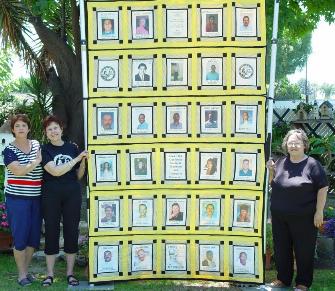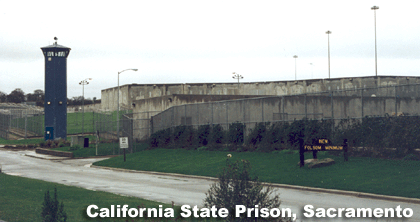California
Initiative
to
Rein-In
Three-Strikes
Law
Appears
Headed
for
Victory
10/22/04
Ten years ago, California voters frightened by violent crime and led by politicians who manipulated that fear voted to enact what is popularly known as the three-strikes-you're-out law. Under three-strikes, persons with two previous violent or "serious" felonies can be imprisoned for life, with no opportunity for parole for at least 25 years, if they are convicted of a third felony. Under three-strikes, that third felony need not be violent or "serious."
While the three-strikes law was ostensibly aimed at violent career criminals, the net it created was cast so wide that it also captured thousands of petty criminals, including drug users who ended up being sentenced to life in prison for a third offense that was often no more than simple drug possession, in many cases of amounts that could be charged as misdemeanors, but were charged as felonies at the discretion of prosecutors. When Californians envisioned three-strikes, they conjured up images of Charles Manson or Richard Allen Davis, the violent repeat offender whose widely publicized murder of 12-year-old Polly Klaas set the political stage for three-strikes. But for every bogeyman like Manson or Davis, there is a Doug Rash or an Edward Parsons. Both men's prior convictions were for burglary, both men were convicted of simple drug possession as their third strike (less than a half-gram of cocaine for Rash, less than a tenth of a gram of methamphetamine for Parsons), and both doing more than 25-to-life under the three strikes law. More than 7,000 people are doing three-strikes sentences in California prisons, while an additional 35,000 are serving longer sentences as well under the law's two-strike provisions. Of those 7,000 three-strikers, more than 4,000 are, like Rash and Parsons, people whose third strikes were nonviolent, including more than 1,200 sentenced for drug offenses. This year's initiative to amend the three-strikes law would remove crimes such as burglary from the list of "serious" or violent felonies and would limit the application of three-strikes sentences only to third offenses that were also "serious" or violent felonies -- not offenses such as stealing a pizza or a set of golf clubs or drug possession. It also includes a measure of retroactivity, allowing for re-sentencing hearings for those serving three-strikes sentences for nonviolent crimes.
Proposition 66 is opposed by Gov. Arnold Schwarzenegger, Attorney General Bill Lockyer, the California District Attorneys Association and the California Correctional Peace Officers Association, which kicked in $150,000 to campaign against it, but opponents are being outspent by a margin of roughly ten-to-one by the initiative's backers. Sacramento car-insurance executive Jerry Keenan, whose son figures to get out of prison early if the initiative passes, has kicked in $1.9 million to the campaign, while billionaire financier George Soros, insurance executive Peter Lewis, and University of Phoenix founder John Sperling contributed $150,000 each, according to campaign finance reports. The money is being funneled through the Yes on 66 Committee (http://www.yes66.org), a group of Sacramento-based campaign pros, while the cleverly-named People Against Violent Crime (http://www.amend3strikes.org) also plays a key role. And it is paying off. Two polls in the last ten days have shown the measure passing easily, with an October 13 Field poll showing 65% in favor with only 18% opposed, while a Los Angeles Times poll Wednesday showed in passing with 62% of the votes. "We had two previous attempts to get on the ballot, and that helped to educate the public," said People Against Violent Crime vice-chair Jim Benson. "There were marches and media stories over the years about some of the more outrageous cases, but it is the money that made the difference. That is what enabled us to get on the ballot," he told DRCNet. Petitioners handed in some 750,000 signatures, he said. "That takes money." While Citizens Against Violent Crime is based in suburban Orange County, Families to Amend California's Three-Strikes Law calls south Los Angeles home. "We are trying to coordinate with the other groups," said Families' youth organizer Rob McGowan. "Our people are doing a lot of precinct walks, visiting churches and campuses, all the basic campaign stuff," he told DRCNet. "We are mostly families of prisoners, mostly minority, while People Against Violent Crime can represent people who have been victimized by real criminals, the ones this law should be targeting. This works to our advantage because we now have advocates on both sides of the table," he said. "This just shows how broad the impact of this law has been," said McGowan. "It is mostly affecting people of color and poor people of all races, but it also affects the middle-class. This law was sold as protecting us from violent criminals, but what it has become is a way to send nonviolent people away for 25 years before they even get a parole hearing!" Opponents of the measure say it is working as intended. "The short answer against Proposition 66 is that dangerous and violent people will be released from prison who shouldn't be," said Attorney General Lockyer in a prepared statement. "I share the view that as a general matter, putting somebody in prison for life for stealing videotapes sounds like a really bad idea. But there also might have been a very long string of crimes that preceded that conviction, and that pattern justifies a long sentence." "We believe Proposition 66 is a lie," prison guards' union Vice President Lance Corcoran told the Los Angeles Times. "It's going to put violent criminals back on the street immediately," he added, failing to note that if the measure passes it will certainly put some prison guards in the unemployment line. The measure would save big bucks, according to the state Legislative Analyst's Office. Savings would run from tens of millions of dollars a year early on to hundreds of millions of dollars a year once the measure's impact is truly felt a few years down the road. The office did say that it would also result in increased parole supervision costs, but those would be only a fraction of the savings from freeing thousands of prisoners. It isn't just advocacy groups or self-interested entrepreneurs who are backing Proposition 66. It has the endorsement of dozens of professional organizations, political groupings, and individuals, including the American Civil Liberties Union and religious, labor, and civil rights groups. Among them is the California Council of Churches, whose political action arm, Church Impact, is supporting the measure. "There is a principle in progressive Christianity known as restorative justice, said the group's deputy director, Elizabeth Sholes. "You don't throw people away because they have been stupid, but that is what is happening the way the law is applied, and that is not what the law is supposed to be about," she told DRCNet. "If people's first and second offenses have not garnered long sentences in the first place, it seems a complete waste of human life to sentence them like that." While many criminal justice reformers would prefer that even violent crime sentencing be left to judges' informed discretion on a case by case basis, limiting the three-strikes mandatory minimum to violent offenders would represent a substantial improvement. With the initiative's language carefully crafted to appeal to voters' concerns about violent criminals and an increasing public understanding that sentencing nonviolent offenders to life in prison is not only wrong but expensive, Californians should soon see a three-strikes law that does what it was sold as doing -- not locking up hapless junkies for life.
|


